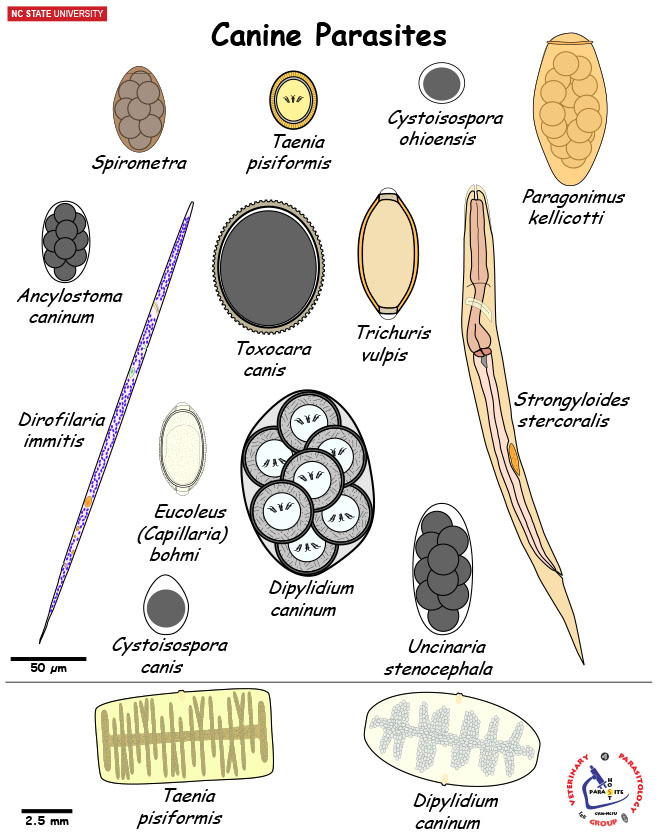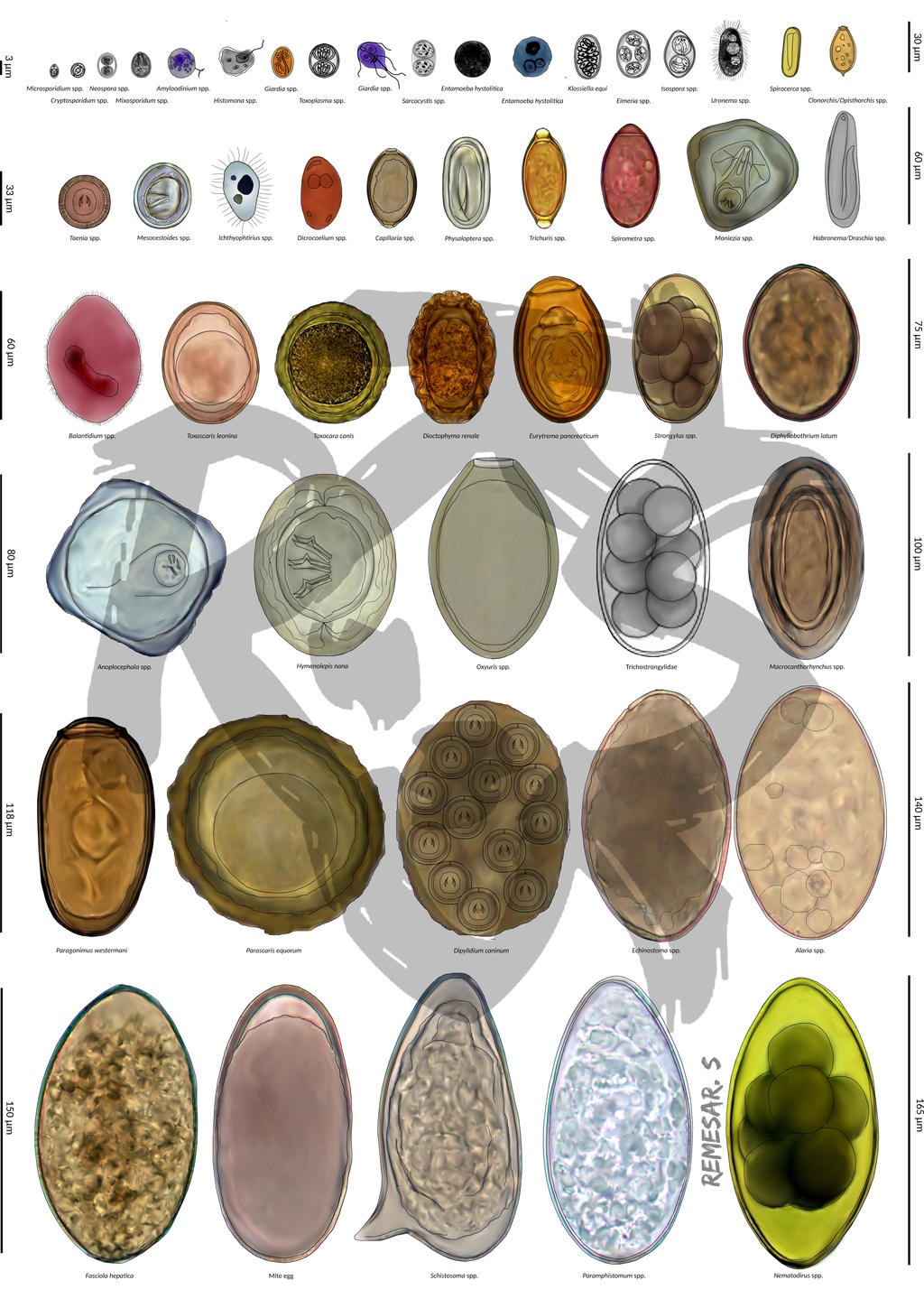
Internal Parasites of Ruminants For the Critters Pinterest
Links with this icon indicate that you are leaving the CDC website.. The Centers for Disease Control and Prevention (CDC) cannot attest to the accuracy of a non-federal website. Linking to a non-federal website does not constitute an endorsement by CDC or any of its employees of the sponsors or the information and products presented on the website.

Canine Intestinal Parasites Chart My XXX Hot Girl
Identification of parasite eggs, cysts, and oocysts by fecal flotation with centrifugation. NameParasite & Ova Identification (Fecal Flotation)Code1196SectionClinical PathologySpeciesAmphibian, Avian, Bovine, Canine, Caprine, Cervid, Equine, Exotic, Feline, Ovine, Porcine, Reptile, RodentSpecimen3-5 g fecesSampling RequirementsExpress air from the bag to maintain moistness. Eggs can hatch in.

Image result for identify intestinal paracite eggs Medical technology
This chapter is a quick reference guide for identifying those parasites often seen in feces, blood, and on the skin of dogs, cats, horses, ruminants, swine, and exotic animals. Common Parasites of Dogs and Cats FIGURE 18-1 Ancylostoma caninum ("hookworm"). FIGURE 18-2 Toxocara canis ("roundworm"). FIGURE 18-3 Toxocara cati ("roundworm").

Eggs from fecal The Goat Spot Forum
This easy and fun to use app includes images and information on approximately 100 veterinary internal parasites found in dogs, cats, small mammals, reptiles, and birds. Learn how to download and use this app in your practice!. Interactive product chart Sign Up. Monthly Alerts Map Alert maps monitor the country and alert pet owners to disease.

Human Intestinal Parasite Identification Chart
Canine Parasite Keys. Basic Keys Common Uncommon Rare. Confirmation Keys Nematode Larvae Eggs with Single Operculum Eggs with Bi-polar Plugs Eggs containing Larva Ascarid eggs Protozoa Trematodes

Pin on Theo
Charles M. Hendrix , DVM, PhD, Department of Pathobiology, College of Veterinary Medicine, Auburn University Reviewed/Revised Jun 2015 | Modified Nov 2022 Internal Parasite (Endoparasite) Diagnosis in Small Animals: Internal Parasite (Endoparasite) Diagnosis in Livestock: External Parasite (Ectoparasite) Examination in Small Animals and Livestock:

Pin on Veterinary Medicine
Egg/Oocyst Comparison - Canine Flotation. The eggs and oocysts in the chart below are those that are somewhat commonly found in dog fecal flotations. The measurement provided below the eggs/oocysts is the published range of the length or diameter of the egg or oocyst. Jun 18, 2021

Identify helminth eggs Parasitology Pinterest Eggs
There are 2 major categories of internal parasites that affect both dogs and cats: Protozoans (eg, Giardia, Toxoplasma, Tritrichomonas) Helminths (eg, roundworms, hookworms, tapeworms).

Image result for identify intestinal paracite eggs Veterinary
Context 1. representative of the four targeted parasite eggs from each slide assessed by the VETSCAN IMAGYST algorithm are shown in Fig.. View in full-text Similar publications Further.

Human Parasite Identification Guide
Parasite eggs are small and oval-shaped. They are typically white or translucent and have a hard shell. Parasite eggs can be found in a variety of places, including in dog poop. When looking for parasite eggs in dog poop, it is important to pay attention to the size, shape, and color of the eggs. Intestinal parasites, such as tapeworms and.

Pin on Bird Rescue
Geoscience Flotation Evaluation of the VETSCAN IMAGYST: An in-clinic canine and feline fecal parasite detection system integrated with a deep learning algorithm Parasites & Vectors 13 (1).

Goat Parasite Identification Chart
There are 2 major categories of internal parasites that affect both dogs and cats: Protozoans (eg, Giardia, Toxoplasma, Tritrichomonas) Helminths (eg, roundworms, hookworms, tapeworms).

The laboratory diagnosis of parasitism Veterian Key
PARASITES INTERNAL PARASITES ADDITIONAL INFORMATION. Flea and/or Tick Merck Activyl® Spot-On for Dogs T indoxacarb. Flea, Tick, and Heartworm Product Chart Feline ph: 855.724.3461 | fx: 888.329.3861 | covetrus.com

The laboratory diagnosis of parasitism Veterian Key
Because an appreciation of relative sizes of parasite eggs, cysts, and oocysts, is very helpful in identification, a line drawing precedes sections showing parasites of common mammalian hosts (Figs. 1.39, 1.40, 1.121, 1.122, 1.162, 1.180). Generally, photographs of eggs and cysts were taken using the high‐dry (40×) objective, although some.

Human Parasite Egg Identification Chart
Toxocara sp. eggs.. Eggs are not clinically diagnostic for human cases as humans are incapable of harboring adult worms that pass eggs. Humans are paratenic hosts for Toxocara spp. and eggs are found only in the feces of definitive hosts (cats and dogs).Toxocara eggs are golden in color, spherical to slightly pear shaped, thick-shelled, and have a pitted surface.

Pin en MICROBIOLOGY SCIENCE
FECRT is performed every time when an animal is subjected to anthelmintic treatment. Perform a Fecal Egg count (EPG) prior treatment (day-0) and repeat FEC 10-14 days after treatment. Calculate the percent egg reduction post treatment using the formula below. Refer the chart below to determine the efficacy of anthelmintic against equine strongyles: